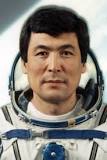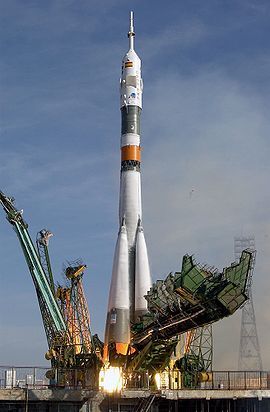Toktar Aubakirov
Kazakh - (RFSA)
Retired
Date of Birth: July 27, 1946
Age: 79
Toktar Ongarbayuly Aubakirov (Kazakh: Тоқтар Оңғарбайұлы Әубәкіров, Russian: Токтар Онгарбаевич Аубакиров, born on 27 July 1946) is a retired Kazakh Air Force officer and a former cosmonaut. In 1991, in accordance with an agreement between the governments of the USSR and the Kazakh SSR, started training at the Gagarin Cosmonaut Training Center. On 2 October 1991 he launched with Russian cosmonaut Alexander Volkov as flight commander, and the Austrian research cosmonaut Franz Viehböck in Soyuz TM-13 from the Baikonur Cosmodrome spaceport, and spent over eight days in space.
Soyuz-U2 | Soyuz TM-12
Soviet Space Program | RussiaBaikonur Cosmodrome, Republic of Kazakhstan
May 18, 1991, 12:50 p.m.
Status: Success
Mission:
Soyuz TM-12 was the 12th mission and the ninth long-duration expedition to Mir space station. The mission began on May 18, 1991, 12:50:28 UTC, launching Commander Anatoly Artsebarsky, Flight Engineer Sergei Krikalyov and Research Cosmonaut Helen Sharman, the first British cosmonaut, into orbit. They docked with Mir two days later. During their stay there, cosmonauts performed EVAs, various station repair and maintenance tasks, and carried out scientific experiments in biology, geophysics, space technology, astronomy etc. They were visited by several Progress resupply spacecrafts and welcomed aboard the Soyuz TM-13 crew. Helen Sharman returned on May 26, 1991, in Soyuz TM-11 spacecraft. While Sergei Krikalyov stayed on the station as a part of the next long-duration expedition, Anatoly Artsebarsky landed safely back on Earth on October 10, 1991, 04:12:18 UTC.
Low Earth OrbitSoyuz-U2 | Soyuz TM-13
Soviet Space Program | RussiaBaikonur Cosmodrome, Republic of Kazakhstan
Oct. 2, 1991, 5:59 a.m.
Status: Success
Mission:
Soyuz TM-13 was the 13th mission and the tenth long-duration expedition to Mir space station. The mission began on October 2, 1991, 05:59:38 UTC, launching Commander Alexander Volkov, Research Cosmonaut/Flight Engineer Toktar Aubakirov and Research Cosmonaut Franz Viehböck, the first Austrian cosmonaut, into orbit. They docked with Mir two days later. During their stay there, cosmonauts performed EVAs, various station repair and maintenance tasks, and carried out scientific experiments in biology, geophysics, space technology, astronomy etc. They were visited by several Progress resupply spacecrafts, and welcomed aboard the Soyuz TM-14 crew. The mission concluded with a safe landing back on Earth on March 25, 1992, 08:51:22 UTC.
Low Earth OrbitThe Roscosmos State Corporation for Space Activities, commonly known as Roscosmos, is the governmental body responsible for the space science program of the Russian Federation and general aerospace research. Soyuz has many launch locations the Russian sites are Baikonur, Plesetsk and Vostochny however Ariane also purchases the vehicle and launches it from French Guiana.
Falcon 9
Starlink Group 6-104
Space Launch Complex 40 - Cape Canaveral SFS, FL, USAA batch of 28 satellites for the Starlink mega-constellation - SpaceX's project for space-based Internet communication system.
Falcon 9
Starlink Group 17-25
Space Launch Complex 4E - Vandenberg SFB, CA, USAA batch of 25 satellites for the Starlink mega-constellation - SpaceX's project for space-based Internet communication system.
Falcon 9
Starlink Group 10-36
Space Launch Complex 40 - Cape Canaveral SFS, FL, USAA batch of 29 satellites for the Starlink mega-constellation - SpaceX's project for space-based Internet communication system. First Starlink laun…
Falcon 9
Starlink Group 6-103
Space Launch Complex 40 - Cape Canaveral SFS, FL, USAA batch of 29 satellites for the Starlink mega-constellation - SpaceX's project for space-based Internet communication system.
Falcon 9
Starlink Group 17-13
Space Launch Complex 4E - Vandenberg SFB, CA, USAA batch of 24 satellites for the Starlink mega-constellation - SpaceX's project for space-based Internet communication system.



